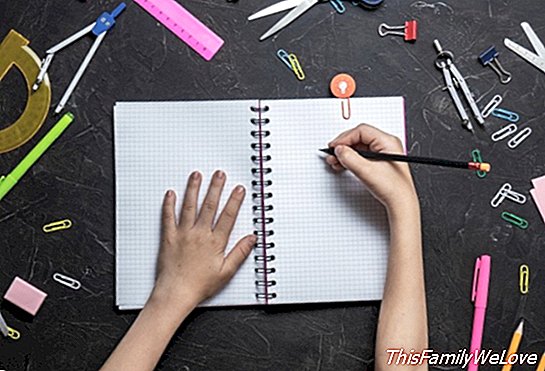Children and their New Year's resolutions: 5 tips to meet them

We all make plans and new Year's resolutions, we started a new cycle and with that we set ourselves new intentions. But what about our children? Do they also make a New Year's resolution? Should we insist that they do so? Is it good for them? And in that case, how should these good purposes be?
All people are constantly developing, and children especially evolve. The purposes serve as the basis for personal development, to improve what we are and to get closer to what we would like to be.
New Year's purposes in children
Children need New Year's resolutions, as intentions, as objectives to fulfill. It is not about focusing on the objective, on the purpose itself, but on the path to achieve it. The purpose is that which will guide the child's behavior to achieve an end. It does not matter if the end is fulfilled or not, but it does matter how he has directed his behavior and what he has learned.
Children are born without knowing what is appropriate, and little by little they will learn it in a process of social development. Knowing what they have to do and what goals they have to pursue is a great learning that they must face, the purposes are a fun and clear way to bring children to their goals.
How should New Year's purposes be in children?
New Year's purposes for children must be understood as intentions, as goals that guide their way of acting. Let's see how we can propose these purposes:
1. Clear and well-defined purposes. We can not propose a purpose like behaving better, we must define what we expect from the child. For example, we can propose the following purposes: help pick up, do homework, not answer, etc.
2. The purposes must be agreed with the child, and even decided by him. If we want him to be involved and understand the meaning of it, it is important that it is his decision and not an external imposition.
3. Realistic purposes that the child can fulfill, We can not propose difficult goals to achieve in a long period of time. Instead we will choose goals or purposes that the child can achieve, in a more or less short time.
4. The purposes should be attractive to the child. That is, in addition to the purpose we will show you the benefit that you can achieve with it.
How do we help children with their New Year's resolutions?
In order for the child to fulfill his New Year's resolutions we can help him and accompany him in this process, let's see how we can do it:
1. We decide together, talk to the child and listen to him, let him decide his purposes. You can guide and guide him, but the decision must be his.
2. Write down each purpose on a piece of cardboard that is visible. It is important that the child help us with this. Between all we can make the board of purposes. We can make a board for each month, where we note the purpose and leave a box for each day. In that box we will make a mark when we fulfill the purpose and a brand when we do not comply. The mark can be a drawing, a sticker, etc. The important thing is that the child is aware of his progress. For example, if one of your purposes is to bathe yourself, every day that you do so we mark it.
3. We can establish a system of reinforcements. For example, when you have completed 10 days with the purpose, we reward you with something, such as watching the movie you choose, giving your favorite dessert, playing whatever he wants, etc.
4. We will not press the child, We will try to get him involved with his board and his plan.
5. It is important that we as adults become involved And let's also fulfill our purposes. Children learn more from what they see, than from what we tell them.
Celia Rodríguez Ruiz. Clinical health psychologist. Specialist in pedagogy and child and youth psychology. Director of Educa and Aprende. Author of the collection Stimulate Reading and Writing Processes.




